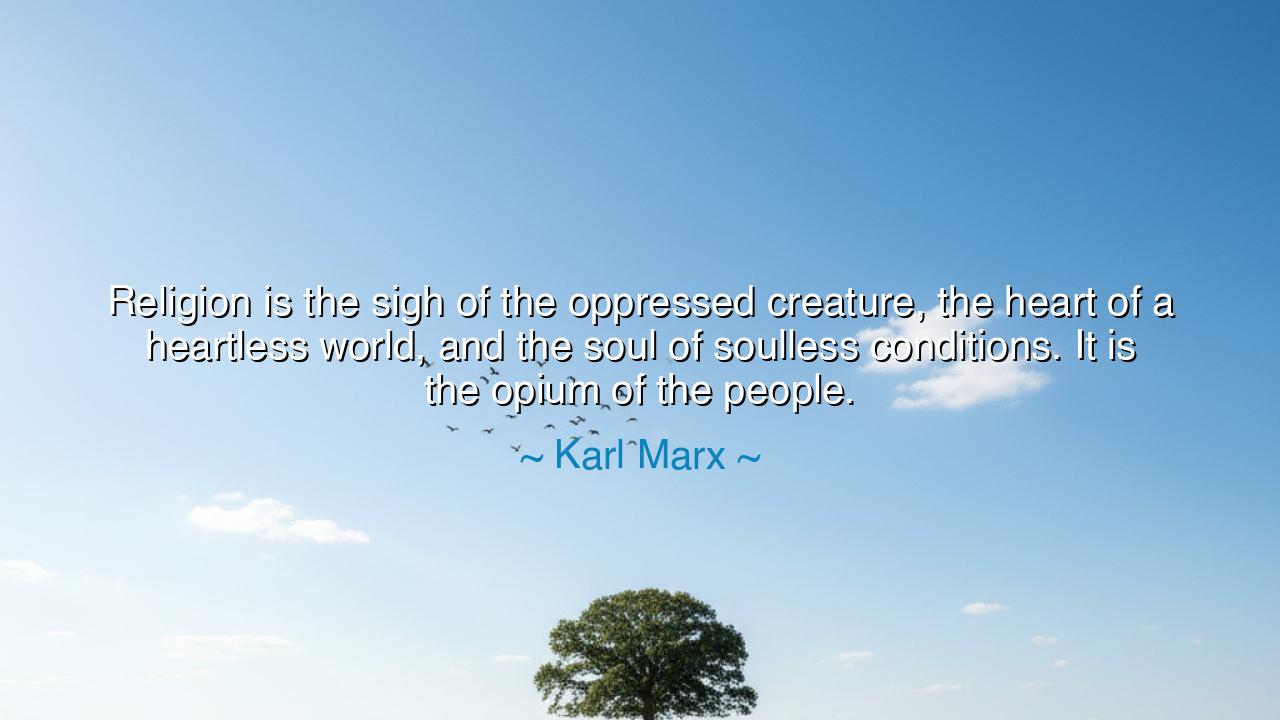
Religion is the sigh of the oppressed creature, the heart of a
Religion is the sigh of the oppressed creature, the heart of a heartless world, and the soul of soulless conditions. It is the opium of the people.






“Religion is the sigh of the oppressed creature, the heart of a heartless world, and the soul of soulless conditions. It is the opium of the people.” Thus wrote Karl Marx, the thinker and revolutionary whose words cut through the illusions of his age like lightning across a darkened sky. In this solemn and haunting declaration, Marx sought not merely to condemn faith, but to understand it — to uncover the human cry that echoes behind the walls of every temple. To him, religion was both a comfort and a chain, both a balm to the wounded spirit and a veil that concealed the true wounds of society.
Marx lived in the nineteenth century, a time when the world was being reshaped by the fires of industry and the cruelty of inequality. The factories of Europe roared with labor, and millions toiled in poverty while a few bathed in wealth. He saw men and women broken under the weight of their misery, stripped of dignity and hope. In their despair, they turned to religion — to the promise of heaven, to the comfort of divine justice. It was in this context that Marx called religion the “sigh of the oppressed creature.” It was not a sneer at their faith, but a recognition of their pain. Their prayers were the sighs of the weary, their hymns the cries of the enslaved heart. Religion was their refuge, their comfort, their last light in a world grown dark.
Yet, Marx also called this same religion “the heart of a heartless world, and the soul of soulless conditions.” By these words, he acknowledged that when society becomes cold and unjust, faith becomes the only warmth left to the poor. In a world without mercy, religion offers compassion; in a life without purpose, it offers meaning. Thus, religion arises as both protest and consolation — it heals the wound even as it distracts from its cause. Like a candle in the night, it glows gently, but it cannot bring the dawn. Marx understood this paradox: religion gives life to the spirit, even as it allows men to endure the very chains that bind them.
It was from this truth that Marx uttered his most famous phrase — that religion is the opium of the people. In his time, opium was not only a drug of pleasure, but of pain relief. It dulled suffering, soothed the nerves, and allowed the broken to bear what might otherwise destroy them. So too, said Marx, does religion comfort the oppressed — but in doing so, it risks numbing their will to resist. Just as a wounded man who feels no pain may bleed unnoticed, the worker who finds solace only in heaven may forget to demand justice on earth. Thus, Marx’s warning was not against the faithful, but against the forces that use faith to keep men quiet, humble, and submissive. Religion, he feared, had been turned from a force of liberation into a tool of control.
History has given us countless examples of both the healing and the corruption of faith. Consider the medieval peasants of Europe, who, crushed under feudal lords and endless labor, were told by the Church that their suffering was holy — that their reward awaited in the next life. Many accepted this, not out of ignorance, but out of desperation; faith was all that kept their hearts alive. Yet, when men like Martin Luther and others rose to challenge the powers of corruption, religion once again became a banner of courage and truth. In those moments, faith ceased to be an opiate and became a flame — a fire that burned away falsehood and awakened the conscience of mankind.
Marx’s words, therefore, are not a simple condemnation of religion, but a call to awaken. He asks humanity to look beyond comfort and toward change, to build a world so just and humane that men no longer need to find their peace in illusions. He dreamed of a society where compassion, equality, and purpose would no longer be confined to sermons, but lived in the streets and the hearts of all. For if religion is the sigh of the oppressed, then the greater task is to heal the oppression that causes the sigh.
So, my child, take this wisdom not as a command to abandon faith, but as a challenge to transform it. If you believe, let your belief move you to action — let it feed the hungry, defend the weak, and confront injustice wherever it hides. And if you do not believe, let compassion be your creed, and truth your temple. Whether through prayer or principle, strive to make this world less heartless, less soulless, less cruel. For when men build justice on earth, there will be no need for opium, no sighs of despair — only the song of the free, rising to heaven or to history, as one and the same.
Thus, the lesson of Marx’s words endures: do not numb yourself with comfort, whether religious or worldly. Feel the suffering of others, and let it move you. Then act — with courage, with love, and with vision. For the true purpose of faith, and of philosophy alike, is not to escape the world, but to redeem it.






AAdministratorAdministrator
Welcome, honored guests. Please leave a comment, we will respond soon